99053-大学英语-第一次读写课
- 格式:doc
- 大小:70.00 KB
- 文档页数:6
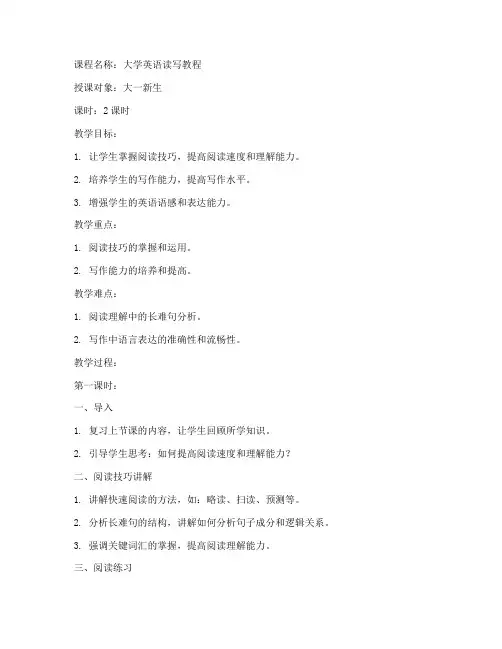
课程名称:大学英语读写教程授课对象:大一新生课时:2课时教学目标:1. 让学生掌握阅读技巧,提高阅读速度和理解能力。
2. 培养学生的写作能力,提高写作水平。
3. 增强学生的英语语感和表达能力。
教学重点:1. 阅读技巧的掌握和运用。
2. 写作能力的培养和提高。
教学难点:1. 阅读理解中的长难句分析。
2. 写作中语言表达的准确性和流畅性。
教学过程:第一课时:一、导入1. 复习上节课的内容,让学生回顾所学知识。
2. 引导学生思考:如何提高阅读速度和理解能力?二、阅读技巧讲解1. 讲解快速阅读的方法,如:略读、扫读、预测等。
2. 分析长难句的结构,讲解如何分析句子成分和逻辑关系。
3. 强调关键词汇的掌握,提高阅读理解能力。
三、阅读练习1. 分组讨论,让学生在小组内进行阅读练习。
2. 针对练习中的问题进行讲解和解答。
四、课堂小结1. 总结本节课所学内容,强调阅读技巧的重要性。
2. 布置课后阅读任务,让学生巩固所学知识。
第二课时:一、导入1. 回顾上节课的内容,让学生谈谈自己的阅读体会。
2. 引导学生思考:如何提高写作水平?二、写作技巧讲解1. 讲解写作的基本结构,如:引言、正文、结论等。
2. 分析写作中的常见错误,如:语法错误、逻辑错误等。
3. 强调语言表达的准确性和流畅性。
三、写作练习1. 分组讨论,让学生在小组内进行写作练习。
2. 针对练习中的问题进行讲解和解答。
四、课堂小结1. 总结本节课所学内容,强调写作技巧的重要性。
2. 布置课后写作任务,让学生巩固所学知识。
教学评价:1. 课堂参与度:观察学生在课堂上的表现,了解他们对阅读和写作的兴趣和积极性。
2. 课后作业完成情况:检查学生的课后阅读和写作任务完成情况,了解他们的学习效果。
3. 课堂提问回答情况:通过提问了解学生对所学知识的掌握程度。
教学反思:1. 根据学生的学习情况和课堂反馈,调整教学策略和方法。
2. 关注学生的个体差异,因材施教,提高教学效果。
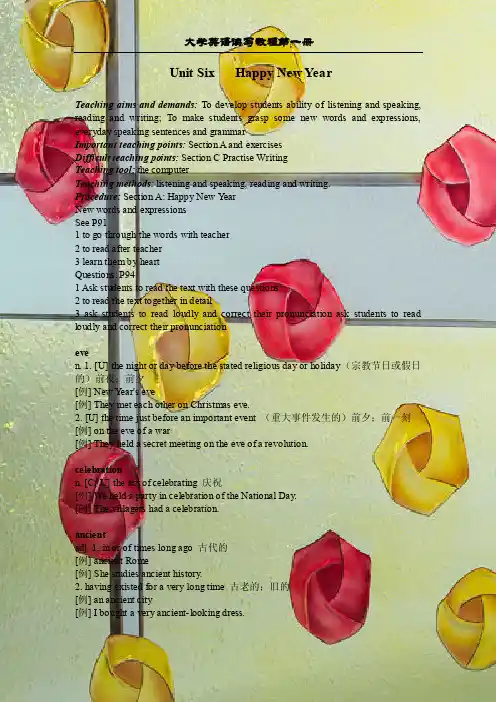
Unit Six Happy New YearTeaching aims and demands: To develop students ability of listening and speaking, reading and writing; To make students grasp some new words and expressions, everyday speaking sentences and grammarImportant teaching points: Section A and exercisesDifficult teaching points: Section C Practise WritingTeaching tool: the computerTeaching methods: listening and speaking, reading and writing.Procedure: Section A: Happy New Y earNew words and expressionsSee P911 to go through the words with teacher2 to read after teacher3 learn them by heartQuestions: P941 Ask students to read the text with these questions2 to read the text together in detail3 ask students to read loudly and correct their pronunciation ask students to read loudly and correct their pronunciationeven. 1. [U] the night or day before the stated religious day or holiday (宗教节日或假日的)前夜;前夕[例] New Y ear's eve[例] They met each other on Christmas eve.2. [U] the time just before an important event (重大事件发生的)前夕;前一刻[例] on the eve of a war[例] They held a secret meeting on the eve of a revolution.celebrationn. [C; U] the act of celebrating 庆祝[例] We held a party in celebration of the National Day.[例] The villagers had a celebration.ancientadj. 1. in or of times long ago 古代的[例] ancient Rome[例] She studies ancient history.2. having existed for a very long time 古老的;旧的[例] an ancient city[例] I bought a very ancient-looking dress.measurev. 1. show or record (length, temperature, etc.) 量出或记录(长度、温度等)[例] The inch measures length.[例] A clock measures time.2. find the size, length, amount, degree, etc. of (something) in standard units 度量(大小、长短、数额、程度等)[例] measure the height of the house[例] Mother measured me to see what size dress I should have.n. 1. (plural) an action taken to bring about a certain result 措施;方法[例] They took strong measures against smoking in the public.[例] What measures shall we take to find the thief?2. [C] an amount or unit in a measuring system 量度单位[例] A meter is a measure of length.Europen. the large area of land that is between Asia and the Atlantic Ocean 欧洲[例] France is a country in western Europe.[例] Europe also has a long history.Christmasn. [C; U] a Christian holy day held on December 25th in honor of the birth of Jesus Christ, usually kept as a public holiday 圣诞节[例] Christmas dinner[例] Children get many Christmas presents every year.importancen. [U] the quality or state of being important 重要;重要性[例] a person of (no) importance[例] This revolution is a matter of national importance.Asian. the world's largest continent 亚洲[例] Asia Minor[例] Asia is the largest continent in the world.。
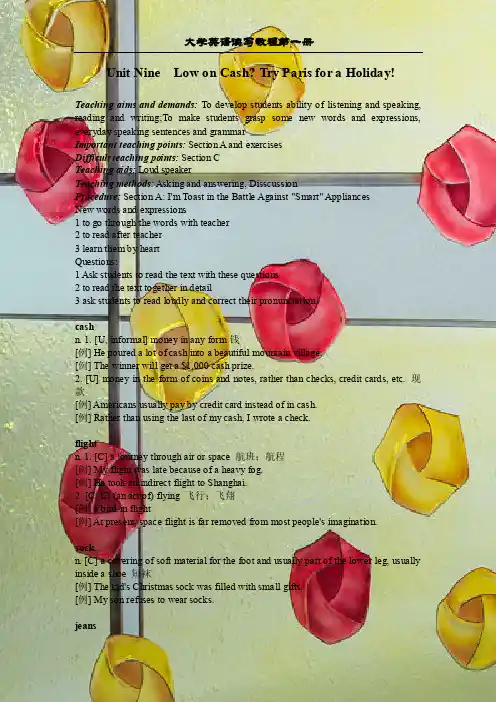
Unit Nine Low on Cash? Try Paris for a Holiday! Teaching aims and demands: To develop students ability of listening and speaking, reading and writing;To make students grasp some new words and expressions, everyday speaking sentences and grammarImportant teaching points: Section A and exercisesDifficult teaching points: Section CTeaching aids: Loud speakerTeaching methods: Asking and answering, DisscussionProcedure: Section A: I'm Toast in the Battle Against "Smart" AppliancesNew words and expressions1 to go through the words with teacher2 to read after teacher3 learn them by heartQuestions:1 Ask students to read the text with these questions2 to read the text together in detail3 ask students to read loudly and correct their pronunciationcashn. 1. [U, informal] money in any form钱[例] He poured a lot of cash into a beautiful mountain village.[例] The winner will get a $1,000 cash prize.2. [U] money in the form of coins and notes, rather than checks, credit cards, etc. 现款[例] Americans usually pay by credit card instead of in cash.[例] Rather than using the last of my cash, I wrote a check.flightn. 1. [C] a journey through air or space 航班;航程[例] My flight was late because of a heavy fog.[例] He took an indirect flight to Shanghai.2. [C; U] (an act of) flying 飞行;飞翔[例] a bird in flight[例] At present, space flight is far removed from most people's imagination.sockn. [C] a covering of soft material for the foot and usually part of the lower leg, usually inside a shoe 短袜[例] The kid's Christmas sock was filled with small gifts.[例] My son refuses to wear socks.jeansn. (plural) trousers made of a strong cotton cloth, worn informally by men, women, and children 牛仔裤[例] Y oung people don't like to wear old-fashioned jeans.[例] The T-shirt goes well with your jeans.backpackn. [C] (especially AmE) a bag carried on one's back, used especially by climbers and walkers (尤指登山者、步行者用的)背包[例] an astronaut's backpack[例] My backpack is filled with food and drinks.burstv. (cause to) break open or break apart suddenly (使)爆裂;(使)破裂[例] If I have any more soup, I'll burst.[例] The children are enjoying bursting balloons.n. [C] an act or result of bursting 裂口;破裂[例] The explosion was caused by a burst in the gas pipe.[例] I was awakened by the burst of something.packagen. [C] an amount or especially a number of things packed together firmly; a parcel 包;包裹[例] Large packages are sometimes left beside the door.[例] She sent him a large package of books.gentlemann. 1. [C] (polite) a man 男士;先生[例] A gentleman was reading a newspaper at the table.[例] My neighbor is an old gentleman.2. [C] a man who behaves well towards other people and who can be trusted to keep his promises and always act honorably 绅士[例] The image was not gentleman-like according to many British people.[例] It is a gentleman's duty to always be polite.criminaln. [C] a person who is guilty of crime 犯人;罪犯[例] The criminal finally went to the police station to give himself up.[例] The criminal was caught when trying to run away.adj. relating to a crime 犯罪的;刑事的[例] criminal trials[例] It's hard for a person with a criminal record to find a good job.couriern. [C] a person or company that is employed to carry messages or other papers 信使[例] the Liverpool Courier[例] I sent my documents to the company by courier.impossibleadj. that cannot happen or be done 不可能的;办不到的[例] It is almost impossible for him to catch up.[例] After the car accident, it was impossible for him to walk.airlinen. [C] a business that runs a regular service for carrying passengers and goods by air (定期运送乘客、货物的)航空公司[例] The airline takes every possible measure to have more passengers.[例] After the disaster, all U.S. airlines lost a great number of passengers.normallyadv. in the usual way; ordinarily 通常地;正常地[例] Applicants normally have at least two years' work experience.[例] At that time, the highway is normally packed with cars and trucks.companyn. 1. [C] a group of people who work together for purposes of business or trade 公司;商号[例] The film company bought the sole rights to two best sellers.[例] This world famous company interviewed 20 people for the job.2. [U] the presence of another person; companions 陪伴;交往[例] May I have your company at the Christmas dinner?[例] She will visit me whenever I feel like company.baggagen. [U] (especially AmE) the cases, bags, boxes, etc. of a traveler 行李[例] Take as little baggage as possible when traveling.[例] Most flights have a baggage allowance of 20 kg per passenger.airplane(aeroplane BrE)n. [C] a plane 飞机[例] The noise outside could be the sound of an airplane.[例] It's desirable that the airplane be as light as possible.contrastn. [U] the comparison of objects or situations that are dissimilar, especially to show differences 对比;对照[例] Black and white shows a striking contrast.[例] Compare and contrast English with Chinese.n. [C] a person who holds an office 官员;高级职员[例] The public knew little about the official's background.adj. of, from, or about a person in a position of power and responsibility 官方的;正式的[例] Why is there so little official action to control air pollution?[例] They will send me an official invitation.taxvt. charge a tax on 对……征税[例] How are your company profits taxed?[例] People in different states are taxed differently.n. [C;U] (an amount of) money that must be paid to the government according to income, property, goods bought, etc. (政府对收入、财产、购货等征收的)税;税款[例] Foreign companies can enjoy tax favors.[例] The old man didn't know how to fill in a tax form.methodn. [C] a planned way of doing something 方法;办法[例] Distance learning is a modern educational method.[例] His English has improved greatly with the method of one-on-one help. negativeadj. 1. without any useful or helpful qualities 消极的;非建设性的[例] Some music can be a negative influence on people.[例] My most negative quality is that I am easy to anger.2. saying or meaning "no" 拒绝的;怀疑的[例] When she asked about dating boys, her parents gave her a negative answer. [例] Too many negative remarks will discourage the kid.aspectn. [C] a side of a many-sided idea, plan, etc. (想法、计划等的某个)方面[例] We don't agree with each other in most aspects.[例] Each aspect of the plan must be considered.personaladj. 1. belonging to, or for the use of a particular person; private 个人的;私人的[例] What I mentioned just now is his personal information.[例] Ann has been working as a personal assistant for over 5 years.2. done or made directly by a particular person 亲自的[例] The mayor paid a personal visit to the old couple.[例] The manager will give you a personal interview.adj. 1. that can change or be changed to be suitable for new needs 可变通的;灵活的[例] She can spend more time with her child because of her flexible working hours. [例] Our plans are fairly flexible.2. that can bend or be bent easily 易弯曲的;柔韧的[例] a flexible rule[例] Dancers need a flexible body.regardn. 1. [U] (in phrases like "in this regard", "with regard to") connection(用于短语像“在这方面”,“关于”)关系;方面[例] The same rules hold true with regard to children.[例] I will make changes with regard to my travel plan.2. (plural) good wishes 致意;问候[例] If you should see our old classmates, give them my regards.[例] He concluded his speech with his best regards to the former president.vt. 1. consider in the stated way 视作; 认为[例] To regard little things as important has produced many great things.[例] Some people regard mountain climbing as a risk to one's life.2. show respect for 尊重[例] Some young people don't regard what old people tell them.[例] Does he regard his wife's feelings?except forapart from; with the exception of 除了……之外[例] I know nothing about my neighbour, except for the fact that he's just moved in. [例] They drove to the city without stopping, except for fuel.check inreport one's arrival at an airport, a hotel desk, etc.(在机场)办理登机手续;(在旅馆)登记办理住宿手续[例] Passengers must check in for Flight CA 985 in half an hour.[例] The old man checked in at our hotel this morning.take off1. get something away from 从……拿掉;拿开……[例] I'll take the books off the table.[例] Let me take that piece of thread off your skirt.2. (of a plane, spacecraft, etc.) to rise into the air at the beginning of a flight 升空;起飞[例] take off smoothly[例] The plane took off at 5 p.m.Now the text:Detailed Study of Text A1. I'm Toast in the Battle Against "Smart" AppliancesMeaning: I'm completely defeated in the battle against the new appliances that are smarter than their owners.be toast: be or be likely to become finished, or dead完了;死定了Y ou are toast if you don't take the doctor's advice.We are toast in the match because he can't play today.2. Recently, The W ashington Post printed an article explaining how the appliance manufacturers plan to drive customers up the wall.Meaning: Lately, The Washington Post printed an article which explained how the firms that produce appliances plan to make customers angry or even mad.drive somebody up the wall: drive somebody into a state of great anger or near madness(非正式)使某人勃然大怒;几乎疯狂The alarm clock is driving me up the wall. It rings whenever it pleases.Are you trying to drive me up the wall? Stop asking that stupid question.3. Of course they don't SAY that exactly.Meaning: Of course the appliance manufacturers don't use the words "drive customers up the wall".Notice here "SAY" is capitalized in order to lay emphasis. Other similar examples can be seen in the rest of the text.4. What they SAY they want to do is to have us live in homes where "all appliances are connected to the Internet, sharing information", and that appliances will be "smarter than most of their owners."Meaning: What the appliance manufacturers declare is that they want to provide the customers with household appliances that are all connected to the Internet, that can share information with their owners, and that are cleverer than most of their users.5. For example, you could have a dishwasher that "can be turned on from the office", and a refrigerator that "knows when it's out of milk."Meaning: For example, you could have a dishwasher at home which you can turn on even when you are in the office, and a refrigerator that would let you know when there is no milk left in it.6. But listen, appliance manufacturers: we don't NEED a dishwasher that we can communicate with from the office.Meaning: But let me tell you, appliance manufacturers: we don't NEED a dishwasher that can be operated when we are in the office.7. If you want to improve our dishwashers, give us one that senses when people leave dirty dishes on the kitchen table, and shouts, "Put that bowl in the dishwasher right now or I'll get your shoes all wet!"Meaning: If you want to make our dishwashers better, give us one like this: when people forget to put the dirty dishes into the dishwasher to be washed, and it knows and will then urge them to do so in a loud voice, "Put that bowl in the dishwasher at once, otherwise I will make your shoes completely wet!"8. Likewise, we don't need a refrigerator that knows when it's out of milk. Meaning: In addition, we don't need a refrigerator that knows when there is no milk left, either.9. W e already have an effective system for determining that: we ask our husbands or wives.Meaning: We already have a good way to get to know if there is any milk left in the refrigerator: we ask our husbands or wives, and they will tell us.10. A real improvement would be a fridge that refuses to let us open its door when it senses that we are about to eat our fourth piece of pie in two hours. Meaning: A fridge that is really better than what we have now is one like this: when we are going to eat our fourth piece of pie in two hours, it will know we are eating too much and will refuse to let us open its door.11. W e can't use the appliance features we have NOW.Meaning: We can't even use the features of the appliances we already have at present (let alone the ones the manufacturers are going to develop in the future).Notice here "NOW" is capitalized to show the contrast between "NOW" and "in the FUTURE"12. I have a feature-packed telephone with 43 buttons, at least 20 of which I am afraid to touch.Meaning: I have a telephone with too many features; it has 43 buttons, but I dare not touch at least 20 of them.13. My phone is probably equipped to communicate with the dead, but I don't know how to operate it, just as I don't know how to operate my television set, which has features requiring TWO remote controls.Meaning: Perhaps my phone has features that enable one to speak to dead people, but I don't know how to make it work. And I don't know how to use my television set either, as it has so many features that one remote control is not enough and thus there are two of them.Key to exercisesReading Outfeatures what for declaring out of dateGetting the MessageDCCDAUsing the Right Wordmanufactures disturb feature declared likewise comprehension industry effective Working with ExpressionsTo at with up out with of toFocuding on Sentence StructureA1. I stopped him as he was about to leave the room.2. He called up when I was about to have breakfast.3. I was about to cross the street when I saw an old man fall down.B1. It has been months since I have tasted such delicious food.2. It has been years since she has written a successful novel.3. It has been years since he has done any new research.TranslatingA1. We must figure out how to solve the problem.2.He looked at the bag as if he were looking at something beyond his comprehension.3.I know how to use a computer, but when it comes to repairing it, I know nothing about it.4. We got lost. What's worse, it started to rain..Using Topic-related Termsequipped operation setting press appliance industry be connected to turned onHomework:Focusing on Sentence StructureTranslatingSection B: A High-tech WomanNew words and expressionsto go through the words with teacherto read after teacherlearn them by heartQuestions:1 Ask students to read the text with these question2 to read the text together in detail3 ask students to read loudly and correct their pronunciationHomework: Exercises from P.113-117The second time.Check up the home work.Section B simply.(student explain it mainly)Reading skill: Reading ActivityReading comprehension skill—Understanding figurative languageJust as painters draw pictures in colours,so writers paint pictures in words. They use figurative language—Language that compares—to produce images in their descriptions or narrations.1.Sometimes non-human things are given human features.2.Sometimes comparisons are made using the words like. ( simile)3.More often comparisons are not stated but suggested. (metaphor)Figurative language is an important stylistic device that writers use. It makes their description or narration more vivid and interesting. Understanding figurative language is an important reading skill which helps readers to recognize the “secret power” of words and appreciate the sensory impressions and emotional reactions created by authors.Writing Skills: Section CSum up and to Collect Questions。
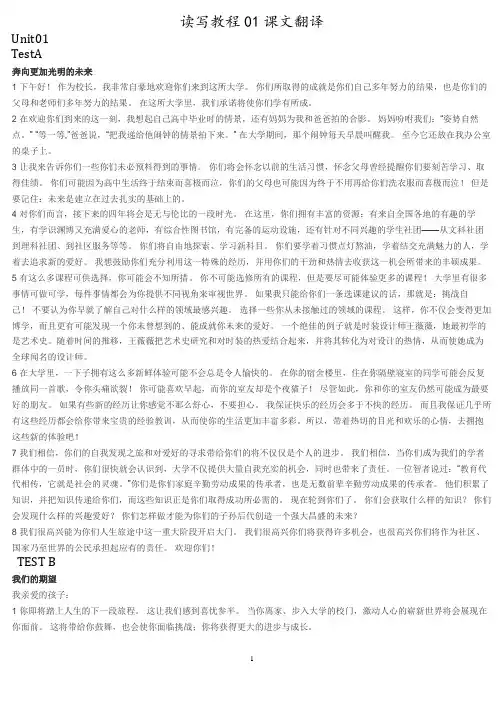
读写教程01课文翻译Unit01TestA奔向更加光明的未来1 下午好!作为校长,我非常自豪地欢迎你们来到这所大学。
你们所取得的成就是你们自己多年努力的结果,也是你们的父母和老师们多年努力的结果。
在这所大学里,我们承诺将使你们学有所成。
2 在欢迎你们到来的这一刻,我想起自己高中毕业时的情景,还有妈妈为我和爸爸拍的合影。
妈妈吩咐我们:“姿势自然点。
”“等一等,”爸爸说,“把我递给他闹钟的情景拍下来。
”在大学期间,那个闹钟每天早晨叫醒我。
至今它还放在我办公室的桌子上。
3 让我来告诉你们一些你们未必预料得到的事情。
你们将会怀念以前的生活习惯,怀念父母曾经提醒你们要刻苦学习、取得佳绩。
你们可能因为高中生活终于结束而喜极而泣,你们的父母也可能因为终于不用再给你们洗衣服而喜极而泣!但是要记住:未来是建立在过去扎实的基础上的。
4 对你们而言,接下来的四年将会是无与伦比的一段时光。
在这里,你们拥有丰富的资源:有来自全国各地的有趣的学生,有学识渊博又充满爱心的老师,有综合性图书馆,有完备的运动设施,还有针对不同兴趣的学生社团——从文科社团到理科社团、到社区服务等等。
你们将自由地探索、学习新科目。
你们要学着习惯点灯熬油,学着结交充满魅力的人,学着去追求新的爱好。
我想鼓励你们充分利用这一特殊的经历,并用你们的干劲和热情去收获这一机会所带来的丰硕成果。
5 有这么多课程可供选择,你可能会不知所措。
你不可能选修所有的课程,但是要尽可能体验更多的课程!大学里有很多事情可做可学,每件事情都会为你提供不同视角来审视世界。
如果我只能给你们一条选课建议的话,那就是:挑战自己!不要认为你早就了解自己对什么样的领域最感兴趣。
选择一些你从未接触过的领域的课程。
这样,你不仅会变得更加博学,而且更有可能发现一个你未曾想到的、能成就你未来的爱好。
一个绝佳的例子就是时装设计师王薇薇,她最初学的是艺术史。
随着时间的推移,王薇薇把艺术史研究和对时装的热爱结合起来,并将其转化为对设计的热情,从而使她成为全球闻名的设计师。
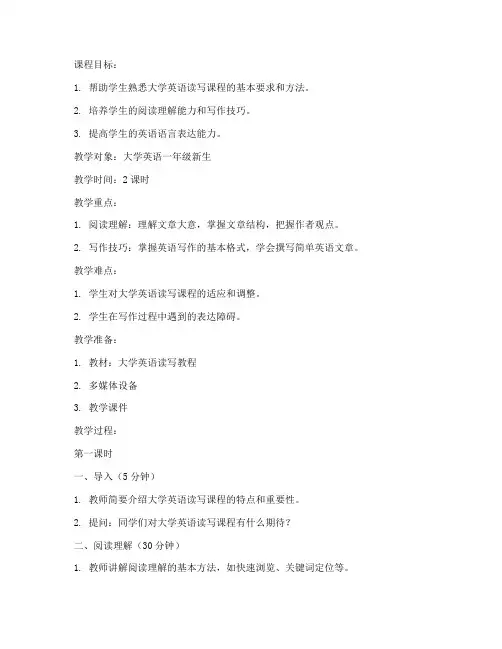
课程目标:1. 帮助学生熟悉大学英语读写课程的基本要求和方法。
2. 培养学生的阅读理解能力和写作技巧。
3. 提高学生的英语语言表达能力。
教学对象:大学英语一年级新生教学时间:2课时教学重点:1. 阅读理解:理解文章大意,掌握文章结构,把握作者观点。
2. 写作技巧:掌握英语写作的基本格式,学会撰写简单英语文章。
教学难点:1. 学生对大学英语读写课程的适应和调整。
2. 学生在写作过程中遇到的表达障碍。
教学准备:1. 教材:大学英语读写教程2. 多媒体设备3. 教学课件教学过程:第一课时一、导入(5分钟)1. 教师简要介绍大学英语读写课程的特点和重要性。
2. 提问:同学们对大学英语读写课程有什么期待?二、阅读理解(30分钟)1. 教师讲解阅读理解的基本方法,如快速浏览、关键词定位等。
2. 学生阅读课文,找出文章大意,并回答以下问题:(1)文章的主题是什么?(2)作者的观点是什么?(3)文章的结构是怎样的?三、讨论与总结(10分钟)1. 学生分组讨论,交流阅读理解过程中的心得体会。
2. 教师引导学生总结阅读理解的关键点。
第二课时一、写作技巧(30分钟)1. 教师讲解英语写作的基本格式,如标题、引言、正文、结论等。
2. 学生练习写作,按照以下要求撰写短文:(1)标题:Your First English Writing Experience(2)正文:简要介绍你的英语写作经历,包括写作目的、写作过程、遇到的困难等。
(3)结论:总结你的写作体会,表达对英语写作的看法。
二、学生展示与评价(20分钟)1. 学生展示自己的写作作品,其他同学给予评价。
2. 教师对学生的写作进行点评,指出优点和不足。
三、课堂小结(5分钟)1. 教师总结本节课的学习内容,强调阅读理解和写作技巧的重要性。
2. 提醒学生在课后继续练习,提高英语读写能力。
教学反思:1. 本节课通过阅读理解和写作练习,帮助学生初步掌握了大学英语读写课程的基本要求和方法。
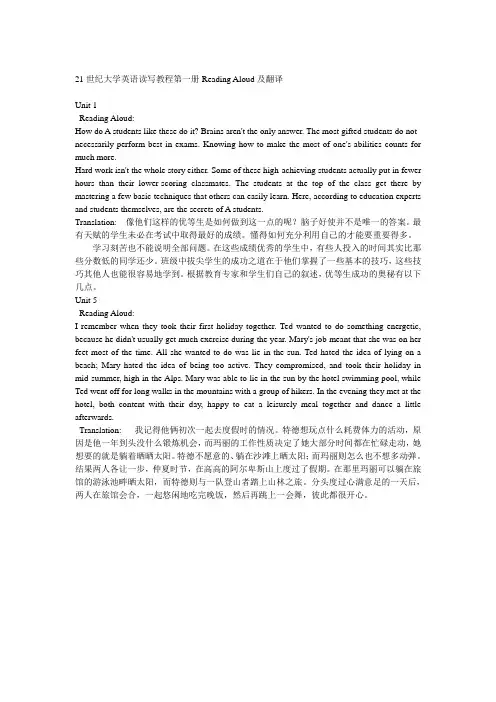
21世纪大学英语读写教程第一册Reading Aloud及翻译Unit 1Reading Aloud:How do A students like these do it? Brains aren't the only answer. The most gifted students do not necessarily perform best in exams. Knowing how to make the most of one's abilities counts for much more.Hard work isn't the whole story either. Some of these high-achieving students actually put in fewer hours than their lower-scoring classmates. The students at the top of the class get there by mastering a few basic techniques that others can easily learn. Here, according to education experts and students themselves, are the secrets of A students.Translation: 像他们这样的优等生是如何做到这一点的呢?脑子好使并不是唯一的答案。
最有天赋的学生未必在考试中取得最好的成绩。
懂得如何充分利用自己的才能要重要得多。
学习刻苦也不能说明全部问题。
在这些成绩优秀的学生中,有些人投入的时间其实比那些分数低的同学还少。
班级中拔尖学生的成功之道在于他们掌握了一些基本的技巧,这些技巧其他人也能很容易地学到。
根据教育专家和学生们自己的叙述,优等生成功的奥秘有以下几点。
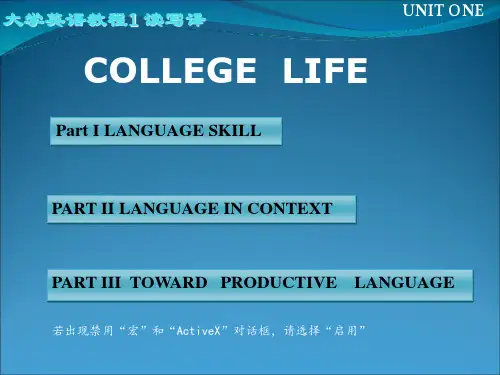
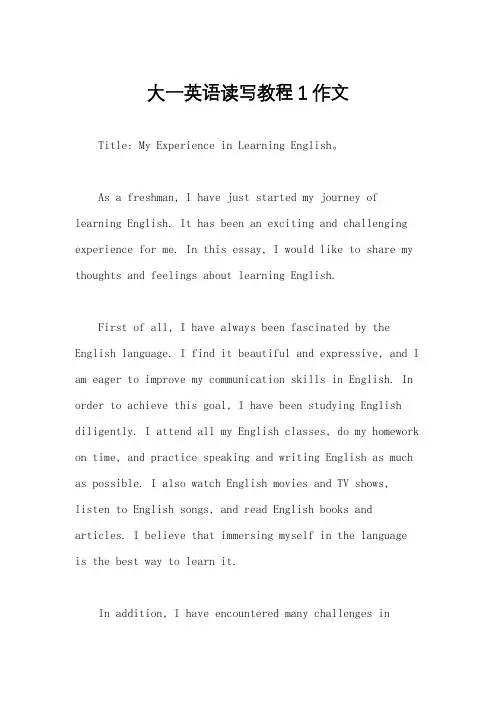
大一英语读写教程1作文Title: My Experience in Learning English。
As a freshman, I have just started my journey of learning English. It has been an exciting and challenging experience for me. In this essay, I would like to share my thoughts and feelings about learning English.First of all, I have always been fascinated by the English language. I find it beautiful and expressive, and I am eager to improve my communication skills in English. In order to achieve this goal, I have been studying English diligently. I attend all my English classes, do my homework on time, and practice speaking and writing English as much as possible. I also watch English movies and TV shows, listen to English songs, and read English books and articles. I believe that immersing myself in the language is the best way to learn it.In addition, I have encountered many challenges inlearning English. One of the biggest challenges for me is pronunciation. English is not my native language, so I often struggle with pronouncing words correctly. However, I have been working hard to improve my pronunciation by practicing with my classmates and teachers. I also use online resources and apps to help me with pronunciation. Another challenge for me is grammar. English grammar is complex and sometimes confusing, but I am determined to master it through practice and perseverance.Despite the challenges, I have made significant progress in learning English. I can now communicate with my classmates and teachers in English with more confidence. I can also write essays and reports in English with greater ease. I have even started thinking in English, which I believe is a sign that I am becoming more proficient in the language. I am proud of how far I have come in such a short time, and I am excited to continue improving my English skills.In conclusion, learning English has been a rewarding experience for me. It has opened up new opportunities forme and allowed me to connect with people from different cultures. I am grateful for the support and encouragement I have received from my teachers and classmates, and I am determined to keep learning and growing in my English proficiency. I believe that with hard work and dedication, I can achieve my goal of becoming fluent in English. Thank you for reading my essay.。
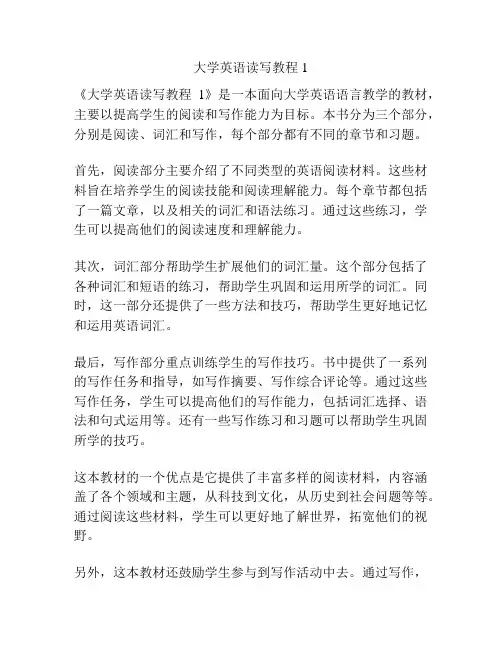
大学英语读写教程1《大学英语读写教程1》是一本面向大学英语语言教学的教材,主要以提高学生的阅读和写作能力为目标。
本书分为三个部分,分别是阅读、词汇和写作,每个部分都有不同的章节和习题。
首先,阅读部分主要介绍了不同类型的英语阅读材料。
这些材料旨在培养学生的阅读技能和阅读理解能力。
每个章节都包括了一篇文章,以及相关的词汇和语法练习。
通过这些练习,学生可以提高他们的阅读速度和理解能力。
其次,词汇部分帮助学生扩展他们的词汇量。
这个部分包括了各种词汇和短语的练习,帮助学生巩固和运用所学的词汇。
同时,这一部分还提供了一些方法和技巧,帮助学生更好地记忆和运用英语词汇。
最后,写作部分重点训练学生的写作技巧。
书中提供了一系列的写作任务和指导,如写作摘要、写作综合评论等。
通过这些写作任务,学生可以提高他们的写作能力,包括词汇选择、语法和句式运用等。
还有一些写作练习和习题可以帮助学生巩固所学的技巧。
这本教材的一个优点是它提供了丰富多样的阅读材料,内容涵盖了各个领域和主题,从科技到文化,从历史到社会问题等等。
通过阅读这些材料,学生可以更好地了解世界,拓宽他们的视野。
另外,这本教材还鼓励学生参与到写作活动中去。
通过写作,学生可以巩固他们的语言表达能力,提高他们的思维能力和逻辑思维能力。
而且,写作训练也是在各个学科和领域中非常重要的一部分,可以帮助学生更好地理解和应用所学的知识。
总之,《大学英语读写教程1》是一本很好的教材,适用于大学英语语言教学。
它提供了丰富多样的阅读材料和写作训练,帮助学生提高他们的阅读和写作能力。
此外,这本教材还注重词汇训练,帮助学生扩展他们的词汇量。
综合来看,这本教材是学习大学英语的必备工具。
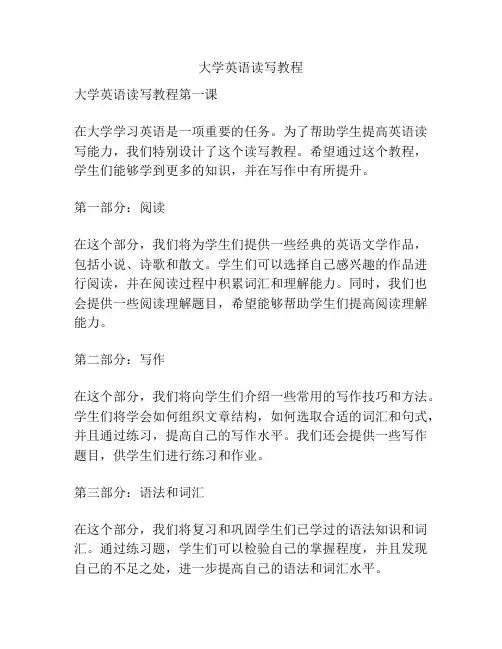
大学英语读写教程
大学英语读写教程第一课
在大学学习英语是一项重要的任务。
为了帮助学生提高英语读写能力,我们特别设计了这个读写教程。
希望通过这个教程,学生们能够学到更多的知识,并在写作中有所提升。
第一部分:阅读
在这个部分,我们将为学生们提供一些经典的英语文学作品,包括小说、诗歌和散文。
学生们可以选择自己感兴趣的作品进行阅读,并在阅读过程中积累词汇和理解能力。
同时,我们也会提供一些阅读理解题目,希望能够帮助学生们提高阅读理解能力。
第二部分:写作
在这个部分,我们将向学生们介绍一些常用的写作技巧和方法。
学生们将学会如何组织文章结构,如何选取合适的词汇和句式,并且通过练习,提高自己的写作水平。
我们还会提供一些写作题目,供学生们进行练习和作业。
第三部分:语法和词汇
在这个部分,我们将复习和巩固学生们已学过的语法知识和词汇。
通过练习题,学生们可以检验自己的掌握程度,并且发现自己的不足之处,进一步提高自己的语法和词汇水平。
第四部分:综合训练
在这个部分,我们将提供一些综合训练题目,包括阅读、写作和语法等方面的题目。
通过这些综合训练,学生们可以综合应用所学的知识,并全面提高自己的英语水平。
在整个教程中,我们鼓励学生们多进行听说读写方面的训练,并且提供了一些相关的学习资源和练习材料。
希望学生们能够认真学习,并在实践中不断提高自己的英语能力。
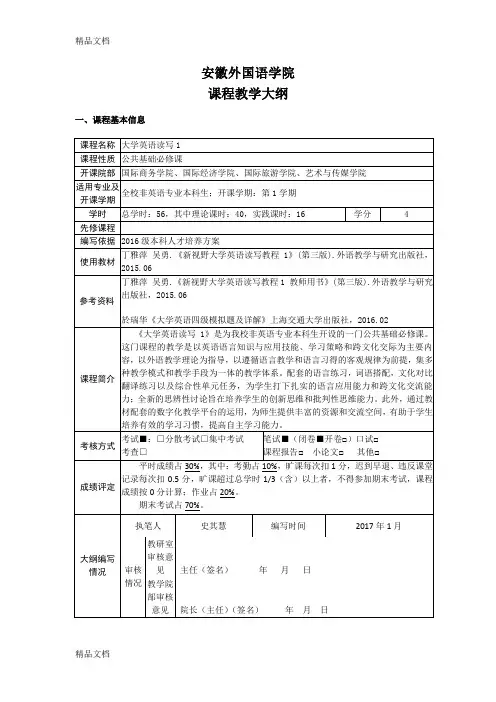
安徽外国语学院课程教学大纲一、课程基本信息二、课程教学目的大学英语读写课程的教学目的是让学生打好扎实的语言基本功,重视培养学生的英语综合应用能力,特别是读、写、译的能力,以便获取有关其专业的最新国际资料,从而开拓其专业视野及提高其专业技能,并使其在今后的工作和社会交往中能用英语有效地进行口头和书面的信息交流。
同时培养和训练学生自主学习能力,提高综合文化素养,以适应我国社会发展和国际交流的需要,使学生能够真正具有良好的国际交流能力。
三、课程教学要求本课程教学大纲在教学要求上分为一般要求阶段(一年级)和较高要求阶段(二年级),本课程属于一般要求阶段。
现将本课程的教学要求规定如下:1、词汇:通过本课程的学习,学生的词汇量应增至4000左右,以及由这些词构成的常用词组,并具有按照基本构词法识别生词的能力,精读量9,000词,泛读量37,000词左右。
2、语法:巩固和加深基本语法知识,提高在语篇水平上运用句法结构的能力。
3、阅读能力:能顺利阅读语言难度中等的一般性题材的文章,掌握中心大意以及说明中心大意的事实和细节,并能进行一定的分析、推理和判断,领会作者的观点和态度,阅读速度达到每分钟90词。
4、听的能力:能听懂英语讲课内容,并能听懂题材熟悉、句子结构比较简单、基本上没有生词、语速为每分钟100--110词的简短会话、谈话、报道和讲座,掌握其中心大意,抓住要点和有关细节,领会讲话者的观点和态度。
5、说的能力:能就教材内容和适当的听力材料进行问答和复述,能用英语进行一般的日常会话,能就听熟悉的话题经准备后作简短发言,表达思想比较清楚、语音、语调基本正确。
6、写的能力:能阅读难度与课文相仿的英语材料并能回答相关问题、写提纲,能就一定的话题或提纲在半小时内写出120--150词的英语短文,能写短信和便条,表达意思清楚。
7、译的能力:能借助词典对题材熟悉的文章进行英汉互译,英汉译速为每小时300英语单词,汉英译速为每小时250个汉字。
课程目标:1. 培养学生阅读理解能力,提高学生的英语阅读水平。
2. 培养学生写作能力,使学生能够根据所学知识进行写作练习。
3. 培养学生运用英语进行口头表达的能力。
教学内容:1. 阅读理解:一篇关于大学生活的英语文章。
2. 写作:根据阅读文章,写一篇关于大学生活的英语短文。
3. 口语表达:就大学生活的话题进行口语练习。
教学步骤:一、导入1. 引导学生回顾上节课所学内容,检查学生对上节课知识的掌握情况。
2. 提出本节课的学习目标,让学生明确学习任务。
二、阅读理解1. 预习:让学生快速浏览文章,了解文章大意。
2. 精读:引导学生逐段分析文章,掌握文章结构、中心思想和细节信息。
3. 问答环节:教师提问,检查学生对文章的理解程度。
4. 总结:引导学生总结文章的主要内容和写作技巧。
三、写作1. 引导学生根据阅读文章,构思自己的短文。
2. 学生进行写作练习,教师巡视指导。
3. 学生展示自己的短文,教师点评并给出修改建议。
四、口语表达1. 学生分组讨论,就大学生活的话题进行口语练习。
2. 各组选派代表进行口头表达,其他组员倾听并给予评价。
3. 教师点评并总结。
五、课堂小结1. 教师总结本节课所学内容,强调重点和难点。
2. 学生分享自己的学习心得。
教学资源:1. 教材:《新视野大学英语读写教程》2. 阅读材料:关于大学生活的英语文章3. 口语练习材料:大学生活相关话题教学评价:1. 学生阅读理解能力的提高,体现在对文章的把握程度和回答问题的准确性。
2. 学生写作能力的提高,体现在短文的结构、内容和语法正确性。
3. 学生口语表达能力的提高,体现在表达流畅、语意明确。
教学反思:1. 教师在课堂教学中要注重激发学生的学习兴趣,提高学生的参与度。
2. 教师要关注学生的个体差异,针对不同学生的学习需求进行教学。
3. 教师要注重培养学生的自主学习能力,提高学生的英语综合运用能力。
课程名称:大学英语一授课对象:大一新生课时:2课时教学目标:1. 培养学生阅读理解能力,提高学生获取和处理信息的能力。
2. 培养学生快速阅读技巧,提高阅读速度和准确性。
3. 培养学生英语写作能力,提高学生的语言表达和逻辑思维能力。
4. 增强学生的英语语感和词汇量。
教学内容:1. 阅读理解:选材为一篇英语短文,内容涉及日常生活、文化背景等。
2. 快速阅读技巧:介绍快速阅读的方法和技巧。
3. 写作训练:以短文为基础,要求学生进行扩写或改写。
教学步骤:第一课时一、导入1. 课堂问候,与学生互动,营造轻松的学习氛围。
2. 介绍本节课的教学目标,让学生明确学习方向。
二、阅读理解1. 预览文章,了解文章大意。
2. 学生分组,讨论文章中的生词和短语。
3. 指导学生进行阅读理解练习,解答学生疑问。
三、快速阅读技巧1. 介绍快速阅读的方法和技巧,如略读、扫读、预测等。
2. 让学生尝试运用这些技巧进行阅读练习。
四、总结1. 对本节课的学习内容进行总结,强调阅读理解的重要性和快速阅读技巧的实用性。
2. 布置课后作业,让学生复习巩固所学内容。
第二课时一、复习1. 复习上节课的学习内容,检查学生对阅读理解技巧和快速阅读方法的掌握情况。
2. 让学生分享自己的阅读体验,提高课堂互动性。
二、写作训练1. 以上节课的阅读文章为基础,要求学生进行扩写或改写。
2. 指导学生进行写作练习,注意语法、词汇和句型运用。
3. 学生分组,互相批改作文,找出优点和不足。
三、课堂展示1. 学生展示自己的作文,教师进行点评。
2. 鼓励学生积极发言,提出自己的观点和看法。
四、总结1. 对本节课的学习内容进行总结,强调写作训练的重要性。
2. 布置课后作业,让学生继续进行写作练习。
教学评价:1. 通过课堂提问、小组讨论、作文批改等方式,了解学生对阅读理解技巧和快速阅读方法的掌握情况。
2. 通过学生作文的完成情况,评价学生的英语写作能力。
教学反思:1. 在教学过程中,关注学生的个体差异,针对不同学生的学习需求进行差异化教学。
大学英语教材读写教程1大学英语教材《读写教程1》是为大学本科生编写的一套英语教材。
本教材旨在帮助学生提高英语阅读和写作能力,培养学生批判性思维和有效的表达能力。
下面将从教材特点、教学方法以及教材优势等方面展开论述。
教材特点首先,教材注重跨学科的内容选择。
教材中选取了来自不同学科领域的文章,如科学、文学、社会学等,以满足学生对多样化知识的需求。
通过涉及不同领域的文章,学生能够更好地了解和掌握相关领域的专业词汇和术语,提高学科学习的能力。
其次,教材注重分层次、渐进式的教学安排。
《读写教程1》的内容难度呈递增趋势,从简单到复杂,从浅入深。
这样的设置有助于学生逐步掌握英语阅读的技巧和方法,从而提高阅读效率和理解能力。
同时,每个单元都有相应的阅读理解和写作练习,使学生在阅读的基础上,能够更好地培养写作能力。
教学方法为了更好地实现教材的教学目标,《读写教程1》采用了多种教学方法。
首先,教材采用主题式教学。
每个单元的文章都围绕特定主题展开,如环保、文化交流、科技发展等,通过这样的设置,学生能够更好地了解和思考相关主题,并且能够通过写作表达自己的观点和看法。
其次,教材注重语言实践教学。
教材中的文章都是真实世界中的英语材料,包括新闻报道、学术文章、文学作品等。
通过阅读和写作练习,学生能够接触到真实的英语语言环境,提高语言运用能力。
教材优势《读写教程1》有以下几个优势。
首先,教材内容丰富多样。
从各个学科领域中精选出的文章丰富了学生的知识储备,并且培养了他们对跨学科知识的理解与应用能力。
其次,教材注重阅读与写作的结合。
每个单元都有相应的写作练习,并且给予学生写作指导和反馈,使学生能够在阅读的基础上,提高写作能力。
再次,教材配套资源丰富。
除了教材本身的文章和练习外,教材还提供了课后练习题、教师辅导书、听力材料等,帮助学生进一步巩固和扩展学习内容。
总结《大学英语教材读写教程1》通过精选的文章、分层次的教学以及多样化的教学方法,帮助学生提高英语阅读和写作能力,拓展学科知识,培养学生综合运用英语的能力。
教学目标:1. 学生能够熟练掌握本单元的词汇和短语;2. 学生能够阅读并理解英语文章,提高阅读速度和阅读理解能力;3. 学生能够运用所学知识进行写作,提高写作水平;4. 培养学生的英语思维能力和跨文化交际能力。
教学内容:1. 词汇:本单元词汇包括:majority,minority,minor,major,narrow,broad,part,whole,trend,pattern,issue,problem,example,case,compare,contrast等;2. 短语:本单元短语包括:in general,in particular,on the one hand,on the other hand,in other words,in conclusion等;3. 阅读文章:《The Importance of Education》;4. 写作:以《My View on Education》为题,写一篇议论文。
教学步骤:一、导入1. 引导学生回顾上一单元所学内容,帮助学生复习巩固;2. 通过提问或小组讨论,激发学生对本单元主题的兴趣。
二、词汇学习1. 教师带领学生复习上一单元的词汇,并引入本单元新词汇;2. 学生跟读词汇,教师纠正发音;3. 学生根据词汇,进行造句练习;4. 教师总结本单元词汇,强调重点词汇。
三、短语学习1. 教师带领学生复习上一单元的短语,并引入本单元新短语;2. 学生跟读短语,教师纠正发音;3. 学生根据短语,进行造句练习;4. 教师总结本单元短语,强调重点短语。
四、阅读理解1. 学生阅读文章《The Importance of Education》,了解文章大意;2. 教师提问,检查学生对文章的理解程度;3. 学生找出文章中的重点句子,进行分析;4. 教师总结文章结构,强调文章主旨。
五、写作训练1. 学生根据题目《My View on Education》,进行写作练习;2. 学生在课堂上展示自己的写作,教师进行点评;3. 学生修改自己的作文,提高写作水平。
大学英语读写教程第一册课文翻译及课后答案Unit 11学习外语是我一生中最艰苦也是最有意义的经历之一。
虽然时常遭遇挫折,但却非常有价值。
2我学外语的经历始于初中的第一堂英语课。
老师很慈祥耐心,时常表扬学生。
由于这种积极的教学方法,我踊跃回答各种问题,从不怕答错。
两年中,我的成绩一直名列前茅。
3到了高中后,我渴望继续学习英语。
然而,高中时的经历与以前大不相同。
以前,老师对所有的学生都很耐心,而新老师则总是惩罚答错的学生。
每当有谁回答错了,她就会用长教鞭指着我们,上下挥舞大喊:“错!错!错!”没有多久,我便不再渴望回答问题了。
我不仅失去了回答问题的乐趣,而且根本就不想再用英语说半个字。
4好在这种情况没持续多久。
到了大学,我了解到所有学生必须上英语课。
与高中老师不。
大学英语老师非常耐心和蔼,而且从来不带教鞭!不过情况却远不尽如人意。
由于班大,每堂课能轮到我回答的问题寥寥无几。
上了几周课后,我还发现许多同学的英语说得比我要好得多。
我开始产生一种畏惧感。
虽然原因与高中时不同,但我却又一次不敢开口了。
看来我的英语水平要永远停步不前了。
5直到几年后我有机会参加远程英语课程,情况才有所改善。
这种课程的媒介是一台电脑、一条电话线和一个调制解调器。
我很快配齐了必要的设备并跟一个朋友学会了电脑操作技术,于是我每周用5到7天在网上的虚拟课堂里学习英语。
6网上学习并不比普通的课堂学习容易。
它需要花许多的时间,需要学习者专心自律,以跟上课程进度。
我尽力达到课程的最低要求,并按时完成作业。
7我随时随地都在学习。
不管去哪里,我都随身携带一本袖珍字典和笔记本,笔记本上记着我遇到的生词。
我学习中出过许多错,有时是令人尴尬的错误。
有时我会因挫折而哭泣,有时甚至想放弃。
但我从未因别的同学英语说得比我快而感到畏惧,因为在电脑屏幕上作出回答之前,我可以根据自己的需要花时间去琢磨自己的想法。
突然有一天我发现自己什么都懂了,更重要的是,我说起英语来灵活自如。
课程目标:1. 培养学生阅读英语文章的能力,提高阅读速度和理解力。
2. 通过阅读,扩大学生的词汇量和语法知识。
3. 培养学生英语写作的基本技巧,提高写作水平。
4. 增强学生的跨文化交际意识。
教学重点:1. 阅读理解:快速阅读、细节理解、主旨大意、推理判断。
2. 写作技巧:段落结构、句型变化、词汇运用、语法正确性。
教学难点:1. 如何提高阅读速度和理解力。
2. 如何运用恰当的写作技巧。
教学准备:1. 教学课件或教材。
2. 阅读材料。
3. 写作模板。
教学过程:一、导入(5分钟)1. 用简短的英语介绍自己,让学生放松心情,进入课堂状态。
2. 提问:What do you think about university life? 引导学生思考大学生活。
二、阅读理解(20分钟)1. 分组讨论:让学生以小组形式讨论阅读材料,互相分享对文章的理解。
2. 指导学生如何快速阅读,找出文章的主旨大意和关键信息。
3. 进行细节理解练习,让学生回答问题,检验对文章内容的掌握。
4. 推理判断练习,提高学生的逻辑思维能力。
三、词汇学习(10分钟)1. 提取文章中的重点词汇,进行讲解和扩展。
2. 通过例句让学生掌握词汇的正确用法。
3. 让学生运用新词汇造句,巩固学习效果。
四、写作技巧(15分钟)1. 介绍写作模板,包括段落结构、句型变化、词汇运用、语法正确性。
2. 以文章为例,分析写作技巧的应用。
3. 学生练习写作,教师巡视指导。
五、课堂总结(5分钟)1. 回顾本节课的学习内容,强调阅读和写作技巧的重要性。
2. 布置课后作业,要求学生复习所学内容,巩固所学知识。
六、课后作业1. 阅读指定文章,完成课后练习题。
2. 按照写作模板,写一篇关于大学生活的短文。
教学反思:本节课通过阅读和写作练习,旨在提高学生的英语阅读和写作能力。
在教学过程中,要注意以下几点:1. 注重学生的个体差异,因材施教。
2. 鼓励学生积极参与课堂活动,提高课堂氛围。
Brief introduction to the teaching in the new semester:●Teaching plan:1) Six Units: Unit 2, 4, 6, 7, 8, 102) A formal test on Apr. 163) Music Knowledge & Singing Competition on May. 74) News Listening Competition on June 45) The course ends on June. 13●The evaluation system:平时成绩:Presentation:Hand in the ppt and draft at least one week before your presentation.The latest news (informative & insightful)Within 10 minutes (video length ≦3 mins)Rubrics: (5’)Delivery: 2’Language: 1’Ppt: 1’Depth of thought: 1’Rubrics:Delivery: 2’Language: 1’Ppt: 1’Depth of thought: 1’Rhetorical DevicesA “rhetorical device”is a use of language that creates a literary effect and, ideally, prompts an emotional response.Rhetorical devices generally fall into three parts: phonetic devices, semantic devices and syntactic devices.Phonetic devices(音韵修辞格):Alliteration(头韵), Assonance(元韵), Consonance(谐音), Onomatopoeia(拟声), etc.Semantic devices(语义修辞格):simile(明喻), metaphor(暗喻), metonymy(借喻), parody (仿拟), hyperbole(夸张), irony(反语), personification(拟人), paradox(隽语), pun(双关), analogy(类比), euphemism(委婉语), satire(讽刺), Zeugma(轭式搭配)etc.Syntactic devices(句法修辞格):parallelism(排比), repetition(重复), inversion(倒装), ellipsis (省略), rhetorical question(设问), parentheses(插入语), etc.Semantic devices:1) Simile:It’s a figure of speech which makes a comparison between two unlike elements having at least one quality or characteristic in common. The comparison is purely imaginative, that is the resemblance between the two unlike things exists only in our minds, not in the nature of the things themselves. To make the comparison, words like “as”, “like”, “so…as”, “as…as”, “seem”, “as though”, “similar to” etc. are used to transfer the quality we associate with one to the other.Signified/subject本体signifier/reference喻体simile marker/comparative word比喻词Used in phrases:1.As stubborn as a mule顽固不化2.As clever as a monkey聪明伶俐3.As cunning as a fox奸诈狡猾4.As strong as a horse/ox力大如牛5.As weak/sick as a cat体弱多病/病入膏肓6.As slippery as eel奸诈狡猾7.As stupid as an owl/a goose愚蠢之极8.As poor as a mouse/rat一贫如洗9.As regular as a clock循规蹈矩10.As pale as a ghost/sheet脸色苍白11.As precise as a surgeon精益求精12.As fresh as a rose生机勃勃13.As cheap as dirt一文不值14.As firm as a rock坚如磐石15.As lithe as a panther轻巧自如16.As bold as brass 厚颜无耻17.As mute as a fish噤若寒蝉18.As close as an oyster守口如瓶19.As sure as a gun千真万确20.As sober as a judge十分清醒Used in sentences:1)Wit without learning is like a tree without fruit.2)He jumped back as if he had been stung.3)The gate of the building seemed to be the entrance to a vast hive of six or seven floor.4)I wandered lonely as a cloud.A andB 结构:and将本体和喻体合在一起陈述,and起到了比喻词的作用。
1) Time and tide wait for no man.2) Love and cough cannot be hid.3) Truth and roses have thorns about them.4) Books and friends should be few but good.5) A word and a stone let go cannot be recalled.覆水难收。
● A is to B as C is to DAs C is to D, so A is to BAs C does D, so A does B. / so does A do B1)Just as Darwin discovered the law of development of organic nature, so Marx discovered the law ofdevelopment of human history.正如达尔文发现有机界的发展规律一样,马克思发现了人类历史的发展规律。
2)As fire tries gold, so does adversity try virtue.3)Air is to man as water is to fish.● A is to B what C is to DWhat C is to D, (that) A is to BWhat C is to D is A to BA does forB whatC does for D1) Parks are to the city what lungs are to the body.2) What sculpture is to a block of marble, (that) education is to the soul.3) Reading is to the mind what exercise is to the body.●may/might as well + 动词原形+ 喻体+ as +动词原形+主体(做…就好像做…)no more / less …thannot any more … than(如同…一样)1)You might as well expect a river to flow backward as hope to move me. 你不能动摇我的决心,正如你不能使河水倒流一样。
2)The greatness of a people is no more determined by their number than the greatness of a man isdetermined by his height. (V. Hugo) 一个民族的伟大并不取决于人口的多少,正如一个人的伟大不能取决于他的身高一样。
3) A student can no more obtain knowledge without studying than a farmer can get harvest withoutplowing. 学生不学习获不到知识,犹如农民不耕作就不能得到收获一样。
4)Our village is no less beautiful than this picture.我们的乡村同这幅画一样美。
2) Metaphor:A metaphor, like a simile, also makes a comparison between two unlike elements, but unlike a simile, this comparison is implied rather than stated. A metaphor is, in a sense, a condensed simile. It is a higher form than simile.1) Jim is as cunning as a fox. (simile)Jim is a fox. (metaphor)2) Beauty, strength, youth, are flowers but fading soon.Duty, faith, love, are roots, and ever green.3) Some books are to be tasted, others to be swallowed and some few to be chewed and digested.(Francis Bacon Of Studies)一些书浅尝即可,另一些书则要囫囵吞下,只有少数的书才值得咀嚼和消化。